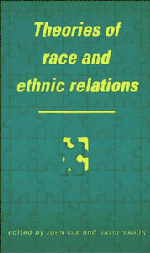Book contents
- Frontmatter
- Contents
- List of contributors
- Preface
- Introduction. Controversies and continuities in race and ethnic relations theory
- 1 Intersecting strands in the theorisation of race and ethnic relations
- 2 Epistemological assumptions in the study of racial differentiation
- 3 The role of class analysis in the study of race relations – a Weberian perspective
- 4 Varieties of Marxist conceptions of ‘race’, class and the state: a critical analysis
- 5 Class concepts, class struggle and racism
- 6 A political analysis of local struggles for racial equality
- 7 Ethnicity and Third World development: political and academic contexts
- 8 Social anthropological models of inter-ethnic relations
- 9 Pluralism, race and ethnicity in selected African countries
- 10 Ethnicity and the boundary process in context
- 11 Ethnicity and the sociobiology debate
- 12 Rational choice theory and the study of race and ethnic relations
- 13 The ‘Chicago School’ of American sociology, symbolic interactionism, and race relations theory
- 14 The operationalisation of identity theory in racial and ethnic relations
- Bibliography
- Index
4 - Varieties of Marxist conceptions of ‘race’, class and the state: a critical analysis
Published online by Cambridge University Press: 01 June 2011
- Frontmatter
- Contents
- List of contributors
- Preface
- Introduction. Controversies and continuities in race and ethnic relations theory
- 1 Intersecting strands in the theorisation of race and ethnic relations
- 2 Epistemological assumptions in the study of racial differentiation
- 3 The role of class analysis in the study of race relations – a Weberian perspective
- 4 Varieties of Marxist conceptions of ‘race’, class and the state: a critical analysis
- 5 Class concepts, class struggle and racism
- 6 A political analysis of local struggles for racial equality
- 7 Ethnicity and Third World development: political and academic contexts
- 8 Social anthropological models of inter-ethnic relations
- 9 Pluralism, race and ethnicity in selected African countries
- 10 Ethnicity and the boundary process in context
- 11 Ethnicity and the sociobiology debate
- 12 Rational choice theory and the study of race and ethnic relations
- 13 The ‘Chicago School’ of American sociology, symbolic interactionism, and race relations theory
- 14 The operationalisation of identity theory in racial and ethnic relations
- Bibliography
- Index
Summary
Introduction
It is a commonplace that the reliance of Marxist theory on the pivotal concepts of mode of production and class, along with the preoccupation with general models of historical development, has precluded Marxists from making a significant contribution to the study of racial and ethnic divisions within capitalist society. The relative absence of a substantive discussion of these questions within the texts of classical Marxism seems to add weight to the assertion made by Frank Parkin that, as a form of social analysis, Marxism is incapable of dealing with such divisions short of subsuming them under more general social relations (production- or class-based) or treating them as a kind of superstructural phenomenon (Parkin 1979a and b).
This commonplace assertion seems to be contradicted, however, by the increased interest among a number of Marxist theorists in clarifying the complex forms of non-class (even if class-related) forms of division and oppression that are characteristic of late capitalist societies, including racial and ethnic divisions, but also gender, national, regional, religious and locality-based divisions. Indeed, over the last decade in particular, a wide variety of Marxist conceptualisations of race, class and the state have emerged, including a substantial body of theoretical studies which attempt to develop a more precise and systematic understanding of racism in capitalist society as rooted in the dominant social relations and power structures (Genovese 1971, Nikolinakos 1973, Hall 1977, 1980b, Gabriel and Ben-Tovim 1978, Sivanandan 1982, Miles 1982, Centre for Contemporary Cultural Studies 1982, Brittan and Maynard 1984).
- Type
- Chapter
- Information
- Theories of Race and Ethnic Relations , pp. 84 - 109Publisher: Cambridge University PressPrint publication year: 1986
- 54
- Cited by



